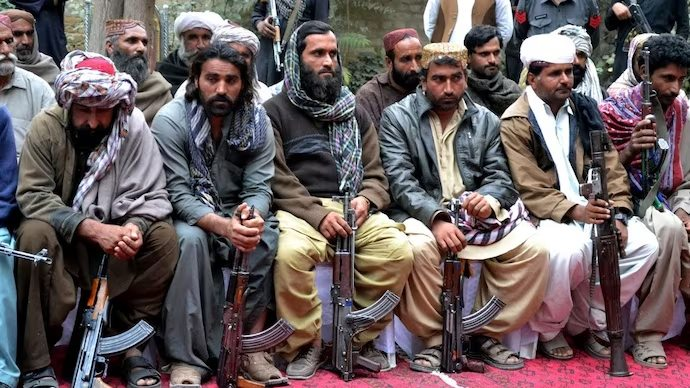'Another Nehruvian edifice seems falling'
People know about Jawaharlal Nehru's utter frustration with the 1962 war when his self-proclaimed Indi-Chini Bhai Bhai slogan with the then Chinese leadership came down falling like a pack of words. On another front he had suffered a shocking setback -- of course after his death, India 'suffered' the real setback. So much for his efficiency as India's first foreign minister and his world figure status.
It was with Iran. Nehru wrote in his hyped book 'Discovery of India': - "Few people have been more closely related in origin and throughout history than the people of India and the people of Iran".
Bur during the 1965 and 1971 war with India, Iran was the first country to hurriedly help Pakistan.
During Indo-Pak war, the Shah of Iran, Mohammad Reza Pahlavi, said "Iran will not accept any attempt to liquidate Pakistan. The Power and India must be fully aware of our resolution.... We do not want a new Vietnam on the frontier of Iran".
Iran supplied Pakistan with arms, sold its oil and went to the extent of acting as an 'arms dealer' to keep the Pakistani war machinery running on both the occasions - 1971 (when Nehru's daughter Indira was PM) and 1965 (When Lal Bahadur Shastri was the PM).
Jump to 2024 -- Narendra Modi is the Prime Minister and Dr S Jaishankar - the External Affairs Minister - and Iran launches missile attack on Pakistan. No one is suggesting, India or India's minister Dr Jaishankar could influence Iran's decision. But it is a matter of fact that two Islamic countries have launched aerial attacks on each other. In other words, the Iran-Pakistan bonhomie has made way to antagonism.
And this could signal end of antagonism between India and Iran.
The recent stand-off is in complete contrast to the bond referred to in 1960s and 1970s. A visibly embarrassed Pakistan has expelled the Iranian envoy and also recalled its ambassador from Tehran.
There is another nugget of information from the legacy point of view.
India had supported Egypt as the 'leader' of the Arab world; and as expected, Iran was furious with New Delhi's stance. Iran and Pakistan 'found' a friend each i n both sides for long. but this time around the military attacks have taken place on either side and altogether 11 people including children have died.
Experts say, the foundation of Iran-Pakistan relations was laid with the birth of Pakistan. Iran became the first country to recognise Pakistan's sovereignty on August 14, 1947. They even signed a treaty of friendship in May 1950. Shah Reza Pahlavi, the Shah of Iran, became the first head of state to visit Pakistan in 1956.
Pakistan also opened its first embassy in Tehran soon after. The friendship helped Pakistan during both the wars against India. In the 1971 war, Iran provided Pakistan with 12 helicopters and military equipment like artillery, ammunition and spare parts. Iran also provided Pakistan with oil, during the war, at cheaper rates, according to a Foreign Relations Of The United States document.
In 1965 earlier, Pakistan faced crisis of military hardware from the West. But Tehran jumped in soon and Iran bought many F–86 jet fighters, air-to-air missiles, artillery and ammunition from West Germany. Some aircraft were delivered to Pakistan, via Iran, while others were home-delivered to Karachi.
Both Iran's attack and Pakistan's response were unprecedented, given their scale and timing against the backdrop of a region in crisis.
A version in 'Dawn' article:
In the 1970s, Baloch politics in Iran and Pakistan trended towards leftist ideologies. Amid the global tension between capitalism and communism, Baloch nationalists aligned themselves with the communist school of thought.
Progressive Baloch and Pakhtun leaders, under the banner of National Awami Party (NAP), briefly governed Balochistan and the former North-West Frontier Province (NWFP) in the early 1970s until Zulfikar Ali Bhutto disbanded the NAP government in February 1973.
In her book, Songs of Blood and Sword, Fatima Bhutto, Bhutto’s granddaughter, suggests that Bhutto’s dissolution of the NAP provincial government was influenced by “pressure from the Shah of Iran”, who feared the rise of an armed Baloch movement in Iranian Baluchistan.
It also says, "Since the 1979 Islamic revolution, Tehran’s harsh treatment of the Baloch has fuelled Sunni radicalism in Siestan-o-Baluchistan. Even before the Iranian revolution, ethnic Baloch from Iran migrated to Balochistan and Karachi, engaging in political activities against the Shah of Iran."
Over time, the diaspora turned more religious, diminishing the once-prominent factor of nationalism seen as a challenge by Iran and Pakistan in the 1970s. This is why the king of Iran, Mohammed Reza Shah Pahlavi, fearing the Baloch insurgency’s potential spread to the 1.2 million Baloch residing in eastern Iran, sent 30 Cobra gunships with Iranian pilots to assist Islamabad during the Baloch incursion in Pakistan from 1973 to 1977, as noted by scholar and journalist, Selig S. Harrison.
Pakistan calls Iranian missile strike “an egregious violation of international law"
Nuclear-armed Pakistan is majority Sunni – the dominant branch of Islam – while Iran and its “axis of resistance” is largely Shia.
The Baluchis believe they were colonised or annexed by Pakistan since 1948
The opening salvo in this fast-moving sequence of events began Tuesday when Iran conducted strikes on Pakistan’s Balochistan province – killing two children and wounding several others, according to Pakistani authorities.
Pakistani security officials inspect the scene of a blast in Quetta, the capital of Balochistan province, on January 17, 2024. (CNN)










No comments:
Post a Comment